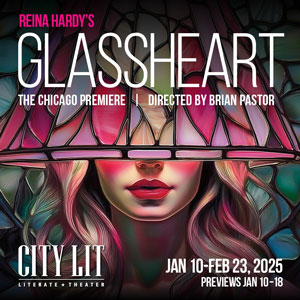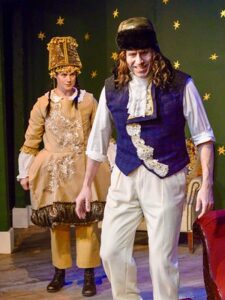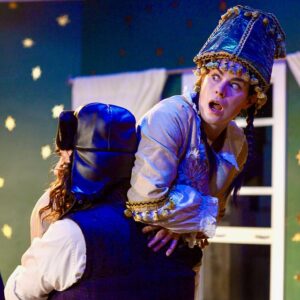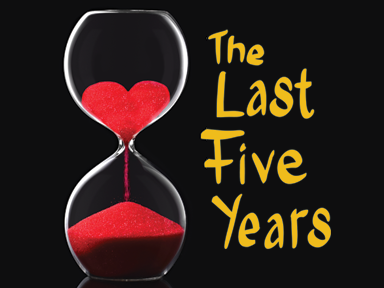
 ** Kat Evans amazes and amuses us with her beautiful singing voice and cherubic acting in the role of Only in the weirdly bizarre fairytale “Glassheart.” Otherwise known as Lamp, she lights up the room every time she takes the stage! But Evans’ dynamism and sheer force of will are not enough to save this confusing work of magical realism that projects a French fairytale from the 18th century onto our world today. While I enjoy plays in this category of fiction, I believe that this particular script could stand some improvement.
** Kat Evans amazes and amuses us with her beautiful singing voice and cherubic acting in the role of Only in the weirdly bizarre fairytale “Glassheart.” Otherwise known as Lamp, she lights up the room every time she takes the stage! But Evans’ dynamism and sheer force of will are not enough to save this confusing work of magical realism that projects a French fairytale from the 18th century onto our world today. While I enjoy plays in this category of fiction, I believe that this particular script could stand some improvement.
“Glassheart” is intended to be a modern-day takeoff on the traditional “Beauty and the Beast” story, with playwright Reina Hardy adding a new twist about women’s empowerment and about a woman not being a fixture in a man’s life. The story also begs the question “What is Beauty?” and “What makes a person beautiful?” The implication is that while a man might define beauty by good looks plus the desire for a woman to serve his needs, women must learn to see past this. When men look at beauty in a superficial way and when women buy into the concept of femininity as subservience, women become complicit in holding themselves down as a sex. The point of this play is that women need to figure out who they are (and what they are) in order to realize what it means to be fully human. The play shows us what can happen when a woman’s consciousness is somehow rattled and raised by other women.
Set in a first floor flat in Chicago at 4951 Seeley Avenue, the magical creatures of Beast (Mark Pracht) and Lamp (Evans) live in an apartment together. Apparently, some type of curse has been placed on Lamp, so that she has been placed in the position of serving the Beast and, for that matter, everybody else. But Beast has a curse on him too, and he acts perfectly beastly! In accordance with the original fairytale, Lamp believes that a woman named Beauty can release her master from the curse, and he will be turned back into a human being… and a prince, no less! As it turns out, a neighbor named Aiofe Lichtman (Caitlyn Murray) has recently moved into the building. She happens to lose her cat, which has made its way to the floor below. When Aiofe comes downstairs to ask Beast if he has seen the animal, Lamp concludes that Aiofe must indeed be the prophesized one, since her name happens to be the Scottish word for “Beauty.” So Lamp kidnaps Aiofe and magically holds her hostage in the apartment while pretending to be her friend. She insists that Aiofe is actually in love with Beast (though it’s never certain whether this is true or not), and Lamp presumptuously tells her that she doesn’t really want to go back to living her ordinary life.
Now if Aiofe is truly Beast’s soulmate and rescuer, then Lamp’s role as servant would become superfluous. Until now, Lamp has seen herself as being a magical creature, existing behind the scenes and fading into the background but making things happen. She never thought of herself as a full being. But now Lamp must ask herself who she really is, independent of her ability to attend to others. Above all, she very much wants to be human, but what does that mean? So she assumes the identity of the kidnapped Aiofe and takes over her life completely. Now Lamp goes to work every day and starts to consider whether having a job, needing money, paying rent, and making friends is what it really means to be human. It is the Witch (Elaine Carlson) (a/k/a the landlady Mrs. Roos), who points out that being human is more than goiing through the daily grind. She implies that having a meaningful relationship with someone and figuring out who we are on the inside are the things that make us real. Later, it is Aiofe who claims that the first step in becoming human is receiving a unique name, so (spoiler alert) Aiofe lands on the word “Only” in the dictionary and tells Lamp that this will be her name from now on. Lamp subsequently appends the last name of Glassheart to it. When Only chooses her own name, this signifies a new level of self-awareness and a new beginning.

The costumes by kClare McKellaston are generally elegant, yet somewhat of a mish-mash of styles with most having a 18th century flavor, as when the original “Beauty and the Beast” tale was first written. The most creative costume is worn by Lamp, with a bright bulb emanating from the shade on the top of her head. Jeremiah Barr’s scenic design is very good for this type of show. I liked the recreation of the living room in a Chicago apartment, especially the wallpaper, which neatly incorporates Liz Cooper’s lighting design. The dark wallpaper with the stars contains LED lights of various colors. Depending on the mood in a given scene, the lights in each of these stars shine very differently. The result is that the set is mostly mundane but mystical whenever it needs to be. The sound design and composition by Petter Wahlbäck could not have been better for this script, especially with the appropriate insertion of music to establish just the right mood.
Then there are the props by Meghan Norine McGrath. I adored the old-fashioned chaise lounge in burgundy with a wooden frame in the shape of a swan. However, this particular prop didn’t match its description within the context of the script. The chaise is supposed to be made of brocade when it was actually made of velveteen, and the curtains are described as being lovely when they actually are rather cheap-looking. That said, I liked the bookshelves and the old books. But as for the dictionary, I found it strange that when Aiofe opened the volume to what looked like the F’s or G’s, she proclaimed the name “Only.” Some effort should have been made to open the dictionary to a page corresponding with the O’s, that is, past the midpoint of the volume. Of course, this action begged the question: “Why Only?” What is the significance of that name? If Only I knew….
We see early on that magical beings such as the Witch, the Beast, and the Lamp can assume some amount of humanness during the course of the performance. But the veil between the magical realm and the mundane one is often not clear-cut enough so as to be understandable to the audience. When the Witch perceives that Lamp is not human, she knows they can have a conversation. In contrast, when Beast meets Aiofe and Lamp is coaching Beast on what to say to her, Aiofe doesn’t hear their conversation, because she is not a part of the magical realm. It is only after taking a poisoned candy concocted by the Witch that Aiofe obtains the ability to converse with Lamp. Sometimes the Witch is the most interesting character of all. She is quirky but oddly generous when she insists on serving gingerbread men (not gingerbread cookies) in addition to her poisoned candies. Speaking of candy, one of the best parts of the show takes place when Aiofe and Only throw Halloween candy out of the first-floor apartment window. They intentionally want to hit treat-or-treaters so that they don’t come to the door or ring the doorbell. This is darkly funny and nicely done, although it does take away from the main theme, having to do with the growth of Lamp as a human being and her realization that Beast might always remain a beast. But perhaps becoming human also entails the ability to enjoy humor, act insipidly, become self-centered, and learn how to be mean to other people when one feels like it.
Even though I was never bored, the show went on for much too long. The focus was all over the place, and a lot more should have been explained in the first act. Too many aspects were silly, inconsistent, or overdone. Nevertheless, there is a lot to work with in this story, and I liked the idea that what is truly human is to love yourself and to be loved for being the person you truly are. But beyond that, the original “Beauty and the Beast” had a certain romantic quality, which I just didn’t see here. Perhaps adding somewhat more romance and affection back into the tale is the glue that might make this story work better.
 “Glassheart”, directed by Brian Pastor, is playing through February 23, 2025, at City Lit Theatre, 1020 W. Bryn Mawr Avenue, in Chicago, on the second floor (accessible via elevator) of the Edgewater Presbyterian Church.
“Glassheart”, directed by Brian Pastor, is playing through February 23, 2025, at City Lit Theatre, 1020 W. Bryn Mawr Avenue, in Chicago, on the second floor (accessible via elevator) of the Edgewater Presbyterian Church.
General Admission Tickets: $35
Seniors: $30
Students and military: $12
For more information or to purchase tickets, go to: https://www.citylit.org/ or call 773-293-3682.
To see what others are saying, visit www.theatreinchicago.com, go to Review Round-Up and click at “Glassheart”.






More Stories
“The Firebugs” reviewed by Julia W. Rath
“The Book of Grace”
“The Last Five Years” MILWAUKEE